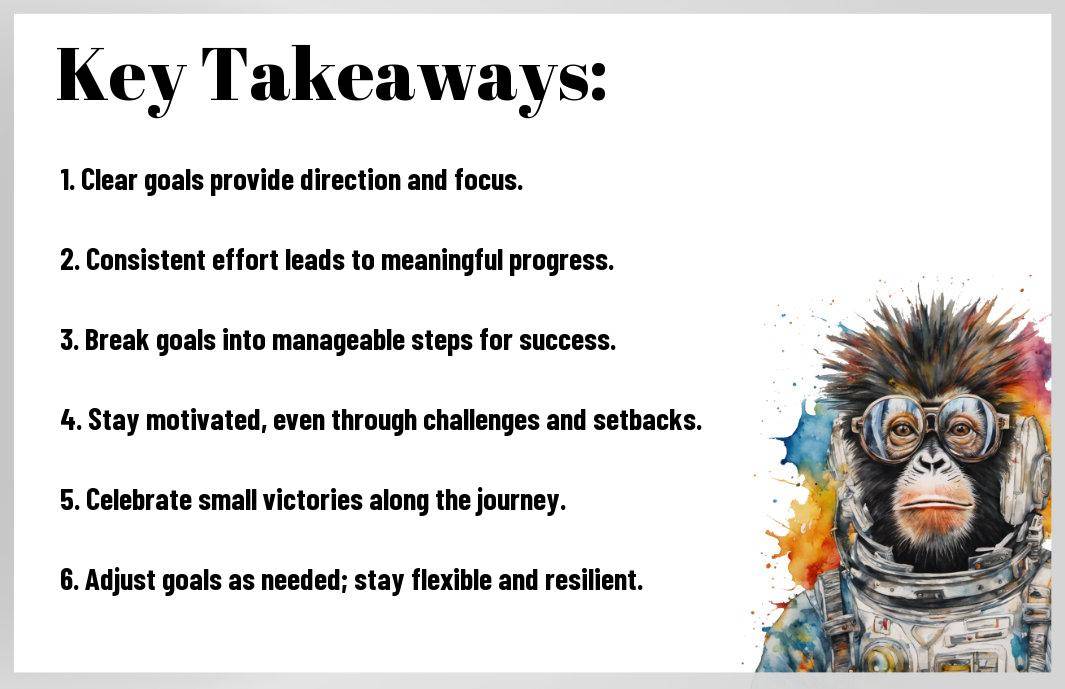
Newsletter Subscribe
Enter your email address below and subscribe to our newsletter

Enter your email address below and subscribe to our newsletter

There’s a powerful connection between determination and achieving your goals. I believe that when you set clear objectives and dedicate yourself to working hard, you pave the way for success. It’s important to visualize your aspirations, create a structured plan, and stay focused, even when faced with challenges. By embracing determination, you can transform obstacles into opportunities and turn your dreams into reality. Join me as we explore the strategies that can help you channel your determination to achieve remarkable results.

For anyone looking to achieve success, setting goals is imperative. Clearly defined goals provide direction and motivation, helping you stay focused and committed to your path. According to the article Accomplishment, Determination, And Success – 554 Words, establishing well-defined objectives plays a pivotal role in your journey towards fulfillment and accomplishment.
Importance lies in breaking down your ambitions into specific, measurable, and achievable targets that serve as stepping stones towards your ultimate vision. This makes the journey more manageable, and your progress more measurable.
Any effective goal-setting strategy involves understanding the difference between short-term and long-term goals. Short-term goals typically focus on immediate achievements, while long-term goals provide a broader vision for your future. Here’s a breakdown:
| Short-term Goals | Long-term Goals |
| Usually achievable within days or weeks | Achievable over months or years |
| Specific and immediate actions | Broader vision of aspirations |
| Motivate towards long-term vision | Create a roadmap for life |
| Frequently updated | Stable over time |
In addition, understanding how these two types of goals interact is vital for success. I often find that my short-term goals act as catalysts for achieving my long-term aspirations. They keep me motivated and focused on the steps I must take. Here’s a related breakdown:
| Short-term Goals Benefits | Long-term Goals Benefits |
| Encourages immediate action | Shapes your ultimate vision |
| Builds momentum and motivation | Reflects your true aspirations |
| Allows for quick adjustments | Endures through changes |
| Enhances focus on daily tasks | Provides lifetime purpose |
| Facilitates a sense of accomplishment | Gives direction to your life |
The combination of effectively managing both short-term and long-term goals solidifies a well-rounded approach to success, significantly improving your chances of achieving your dreams.
There’s a wealth of strategies available to enhance your goal-setting process. By employing specific techniques, you can not only clarify your objectives but also maintain the motivation needed to reach them. I focus on methods like the SMART goals framework and visualization techniques, both of which can significantly impact my progress and success in achieving what I set out to do.
By utilizing the SMART goals framework, you can create a clear and actionable roadmap for your aspirations. This method emphasizes setting goals that are Specific, Measurable, Achievable, Relevant, and Time-bound, ensuring that your goals are well-defined and attainable within a realistic timeframe.
Across various disciplines, visualization techniques have proven effective in helping individuals reach their goals. Visualizing success not only increases motivation but also strengthens your confidence as you work toward your objectives.
Goals can often feel daunting, but engaging in consistent visualization techniques helps me cultivate a positive mindset. By clearly imagining my desired outcomes and picturing my journey to success, I can create a mental image that enhances my ambition. This form of mental rehearsal can bolster my perseverance and drive, allowing me to remain focused on my objectives even in challenging times. As you adopt this practice, I encourage you to enrich your vision with emotions that align with your goals, reinforcing the positive energy needed to push through any obstacles that may arise.
Now, developing a strong work ethic is necessary for achieving any goal. It requires dedication, perseverance, and a willingness to push through challenges. By cultivating a consistent routine and prioritizing your tasks, you set yourself up for success. I find that establishing clear boundaries and focusing on my responsibilities each day helps reinforce this work ethic, allowing me to tackle my ambitions with vigor and commitment.
To build a solid foundation for your work ethic, motivation and discipline must go hand in hand. I often remind myself that motivation can fluctuate, but discipline ensures that I stay on track even during tough times. By setting daily commitments and following through with them, I create a habit of hard work that becomes second nature.
Among the many skills I’ve developed, effective time management stands out as a game changer in my journey toward success. By prioritizing tasks and allocating specific time slots, I can maximize productivity and minimize stress.
It is necessary to allocate time wisely, as poor time management can lead to missed deadlines and overwhelming workloads. I find that using tools like calendars and to-do lists significantly enhances my ability to focus on important tasks while eliminating distractions. Setting realistic goals for each day ensures I’m making progress without burning out. Taking breaks and reassessing my priorities regularly allows me to remain energized and engaged with my work, making time management a vital component of my overall success.

All goals come with their share of challenges, but facing these obstacles is an imperative part of the determination journey. By developing resilience, you can push past barriers that threaten to hold you back. For more insights on this topic, check out What Is Determination? (With Definition, Examples and Tips). Embracing the struggles you encounter not only strengthens your resolve but also fosters personal growth.
Challenges may manifest in various forms, from self-doubt and fear of failure to external pressures and unexpected setbacks. By recognizing these common hurdles early on, you can develop strategies to navigate them effectively. Whether it’s maintaining motivation or managing time, identifying these challenges will empower you to stay focused on your goals.
Identifying effective solutions and coping mechanisms allows you to tackle obstacles head-on. Techniques such as goal-setting, positive affirmations, and seeking support from peers can significantly enhance your ability to overcome difficulties. Additionally, practicing mindfulness and self-reflection can lead to a deeper understanding of your emotions and responses.
And as you navigate these hurdles, it’s vital to cultivate strong problem-solving skills and to stay adaptable in the face of adversity. Engaging in open communication with friends or mentors can provide fresh perspectives and reinforce your motivation when the going gets tough. By focusing on proactive strategies and maintaining a positive mindset, you can transform challenges into opportunities for growth.
Despite the commitment to achieving your goals, it’s necessary to regularly assess your progress. This not only keeps you motivated but also helps you identify possible obstacles. I recommend implementing effective Goal Setting Techniques: Ways To Effectively Set and … to evaluate your advancements. Regular reflections on your journey can reveal necessary adjustments that keep you moving forward.
Against a fast-paced environment, tracking your goals and milestones becomes vital. I find that setting specific deadlines allows you to visualize your progress clearly. Utilize a planner or digital tools to log achievements and setbacks, ensuring that every step counts toward your ultimate objectives.
At times, your original goals may require reevaluation. Life is dynamic, and it’s often my experience that adjustments are necessary to stay aligned with your evolving priorities. Adapting your goals maintains your momentum and fuels your determination.
Measuring progress is about more than just hitting targets; it’s a reflection of your ongoing journey. As you track your milestones, take the time to acknowledge your achievements and identify learning moments. Remaining flexible and willing to adjust your goals when faced with challenges will help you maintain focus. I believe that by regularly reassessing where you stand, you’re more likely to succeed and stay motivated throughout your endeavor.

Unlike a solitary journey, accountability adds a layer of commitment to your goal-setting process. When you share your objectives with others or report your progress, you create a sense of obligation that can propel you forward. Knowing that someone else is aware of your goals encourages you to stay disciplined and focused. By holding you responsible for your actions, accountability helps cultivate a determined mindset that is vital for success.
Role models and support systems are integral to maintaining your motivation. Surrounding yourself with like-minded individuals who share your aspirations can bolster your resolve and help you stay on track. When you engage with this community, you benefit from their encouragement, advice, and shared experiences, which can inspire you to push through challenges and celebrate your successes together.
An effective mentor can significantly enhance your journey towards achieving your goals. They offer valuable insights and perspectives that you might not have considered. Having someone who believes in you can make a dramatic difference in your determination. This guidance helps you navigate challenges more efficiently and provides a framework to work within. With a mentor, you gain access to their network, which can lead to new opportunities and resources that you may not have known existed.
It is vital to understand the tremendous impact a mentor can have on your success. They can provide direct feedback that improves your performance and offers strategies based on their own experiences. A mentor’s support can be a lifeline during difficult times, reinforcing your belief in your capabilities. When you face setbacks, their encouragement can empower you to view these obstacles as stepping stones rather than dead ends. In essence, a mentorship relationship fosters a growth-oriented mindset, propelling you toward your goals much more effectively.
Presently, I understand that determination is key to achieving our goals. By setting clear objectives and putting in dedicated effort, you can turn your aspirations into reality. It’s about creating a roadmap for yourself and actively pursuing the milestones along that path. I believe that with hard work and a focused mindset, you can overcome challenges and reach your desired destination. Embrace the journey, and let your determination guide you to success.
A: Setting goals is important as it provides direction and purpose. Goals act as a roadmap, allowing you to visualize what you want to achieve and helping you stay focused on your long-term aspirations. By having specific targets, you can measure your progress and stay motivated through each milestone.
A: To set effective goals, follow the SMART criteria: Specific, Measurable, Achievable, Relevant, and Time-bound. Start by identifying what you truly want to achieve, break it down into smaller, actionable steps, and set a timeline for each step. This helps create a clear path toward your objectives and makes them feel more attainable.
A: Hard work is crucial in achieving goals because it involves commitment and persistence. Even the best-planned goals will require effort, discipline, and sometimes sacrifices. Consistent hard work builds skills, fosters resilience, and ultimately leads to progress toward your objectives, ensuring you stay on track even when challenges arise.
A: Staying motivated can be achieved by celebrating small successes along the way, surrounding yourself with supportive people, and regularly reviewing your progress. Setting intermediate goals can provide a sense of accomplishment, and visualizing the end result can keep you focused on the bigger picture during challenging times.
A: Encountering obstacles is a normal part of the goal-achieving process. When challenged, reassess your approach and consider alternative strategies. Persistence is key, so adapt your plan if necessary, seek support from others, and maintain a positive attitude. Learning from setbacks can strengthen your resilience and improve your chances of success.
A: Regular reviews of your goals are highly beneficial. Consider evaluating your progress monthly or quarterly. This allows you to track advancements, make any needed adjustments, and ensure that your goals remain aligned with your evolving interests and circumstances. This periodical assessment keeps your motivation high and helps clarify your next steps.
A: Yes, adjusting your goals is perfectly acceptable and often necessary as situations change or you gain new insights. Flexibility ensures that your goals remain realistic and applicable to your current context. If you find that a goal is no longer relevant or achievable, don’t hesitate to modify it to better reflect your evolving aspirations.